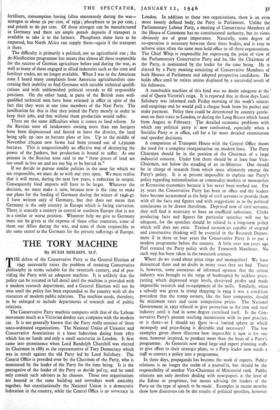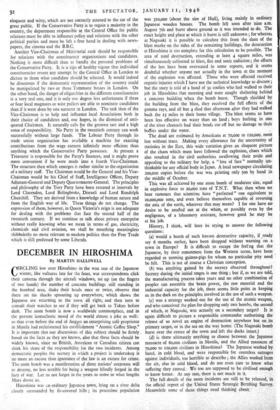THE TORY .MACHINE
By HUGH MOLSON, M.P.
THE defeat of the Conservative Party at the General Election of 1945 necessarily raises the problem of restating Conservative philosophy in terms suitable for the twentieth century, and of pro- viding the Party with an adequate machine. It is unlikely that the policy can be restated in full detail until the machine is provided with a modern research department, and a General Election will not be won until the policy has been expounded to the country with all the resources of modern public relations. The machine needs, therefore, to be enlarged to include departments of research and of public relations.
The Conservative Party machine compares with that of the Labour movement much as a Victorian donkey cart compares with the modern car. It is not generally known that the Party really consists of three unco-ordinated organisations. The National Union of Unionist and Conservative Associations is a loose federation dating from 1872 which has no-funds and only a small secretariat in London. It first came into prominence when Lord Randolph Churchill was elected its Chairman in 1885 as the representative of Tory Democracy which was in revolt against the old Party led by Lord Salisbury. The Central Office is presided over by the Chairman of the Party, who is nominated by the leader of the Party for the time being. It is the prerogative of the leader of the Party to decide pol:cy, and he need only consult such advisers as he chooses. These two organisations• are housed in the same building and nowadays work amicably together, but constitutionally the National Union is a democratic federation in the country, while the Central Office is art autocracy in
London. In addition to these two organisations, them is an even more loosely defined body, the Party in Parliament. Unlike the Parliamentary Labour Party, a meeting of Conservative Members of the House of Commons has no constitutional authority, but its views obviously are of great importance. Naturally, some degree of co-operation is necessary between these three bodies, and is easy to achieve since often the same men hold office in all three organisations. The Chief Whip is responsible for expressing the point of view of the Parliamentary Conservative Party and he, like the Chairman of the Party, is nominated by the leader for the time being. He is elected by a Party meeting consisting of Conservative Members of both Houses of Parliament and adopted prospective candidates. He holds office until he retires unless displaced by a successful revolt of his followers.
A ramshackle machine of this kind was no doubt adequate at the end of Queen Victoria's reign. It.is reported that in those days Lord Salisbury was informed each Friday morning of the week's salaries and outgoings and he would pull a cheque book from his pocket and make payment. Policy then could be determined by country gentle- men on their visits to London, or during the Long Recess which lasted from August to February. The detailed economic problems with which any political party is' now confronted, especially when a Socialist Party is in office, call for a far more detailed examination and speedier decisions.
A comparison of Transport House with the Central Office shows the need for a complete reorganisation on modern lines. The Party Chairman should be in the position of the Chairman of a large industrial concern. Under him there should be at least four Vice- Chairmen, not below the standing of an ex-Minister. One should be in charge of research from which must ultimately emerge the Party's policy. It is at present impossible to explain our Party's policy regarding nationalisation or commodity markets or monopolies or Keynesian economics because it has never been worked out. For 25 years the Conservative Party has been in office and the leaders have become accustomed to the help of civil servants to provide them with all the facts and figures and with suggestions as to the political conclusions to be drawn therefrom. Deprived now of civil servants, they will find it necessary to have an unofficial substitute. Clerks producing facts and figures for particular speeches will not be adequate, for the speeches should be related to a long-term policy which still does not exist. Trained econom:sts capable of original and constructive thinking will be essential in the Research Depart- ment if in three or four years the Conservative Party is to put a modern programme before the country. A little over too years ago Peel restated the Party policy with the Tamworth Manifesto. No such step has been taken in the twentieth century.
Where do we stand about price rings and monopolies? We have denounced them and no doubt in many cases they are bad. There is, however, some consensus of informed opinion that the cotton industry was brought to the verge of bankruptcy by reckless price- cutting which depressed wage levels, destroyed profits and made impossible research and re-equipment of the mills. Similarly, when a subsidy was given to tramp shipping in 1934 it was a condition precedent that the tramp owners, like the liner companies, should fix minimum rates and cease competitive prices. The National Government in 1932 refused to give protection to the iron and steel industry until it had in some degree cartelised itself. Is the Con- servative Party's present teaching inconsistent with its past practice, or is there—as I should say there is—a limited sphere in which monopoly and price-fixing is cksirable and necessary? The few examples given above illustrate how impossible it n.ow is for one man, however inspired, to produce more than the basis of a Party's programme. As Generals now need large and expert planning staffs to give effect to their strategic plans, so a Party leader now needs a st4f to convert a policy into a programme.
In these days, propaganda has become the work of experts. Publ:c relations is no longer the realm of a journalist, but should be the responsibility of another Vice-Chairman of Ministerial rank. Public relations not only involves dealing with newspapers at the level of the Editor or proprietor, but means advising the leaders of the Party on the type of speech to be made. Examples in recent months show how disastrous can be the results of political speeches, however eloquent and witty, which are not correctly attuned to the ear of the great public. If the Conservative Party is to regain a majority in the country, the department responsible at the Central Office for public relations must be able to influence policy and relations with the other political parties and must be left a free hand in dealing with news- papers, the cinema and the B.B.C.
Another Vice-Chairman of Ministerial rank should be responsible for relations with the constituency organisations and candidates. Nothing is more difficult than to handle the personal problems of the Conservative Party. It is a sign of healthy vigour that individual constituencies resent any attempt by the Central Office in London to dictate to them what candidate should be selected. It would indeed be disastrous if the democratic representation of the country could be manipulated by two or three Tammany bosses in London. On the other hand, the danger of oligarchies in the different constituencies is a very real one, and it is only one degree less unfortunate if three or four local magnates or wire pullers are able to nominate candidates than if it were done by one autocrat in London. The task then of the Vice-Chairman is to help and influence local Associations both in their choice of candidates and, one hopes, in the dismissal of anti- quated Chairmen. It naturally calls for the greatest tact and a high sense of responsibility. No Party in the twentieth century can work successfully without large funds. The Labour Party through its trade union organisation has available a machine for exacting contributions from the wage earners infinitely more efficient than anything which the Conservative Party possesses. At present a Treasurer is responsible for the Party's finances, and it might prove more convenient if he were made into a fourth Vice-Chairman. The structure then which emerges is rather similar to the organisation of a military staff. The Chairman would be the General and his Vice- Chairman would be his Chief of Staff, Intelligence Officer, Deputy Adjutant-General and Deputy Quartermaster-General. The principles and philosophy of the Tory Party have been restated at intervals by Lord Clarendon, Lord Bolingbroke, Disraeli and Lord Randolph Churchill. They are derived from a knowledge of human nature and from the English way of life. These things do not change. The expression of them, however, in Queen Victoria's reign is not adequate for dealing with the problems that face the second half of the twentieth century. If we continue to talk about private enterprise without really knowing what we mean in terms of. gas, electricity, chemicals and civil aviation, we shall be mouthing meaningless shibboleths no more relevant to modern politics than the Free Trade which is still professed by some Liberals.































 Previous page
Previous page